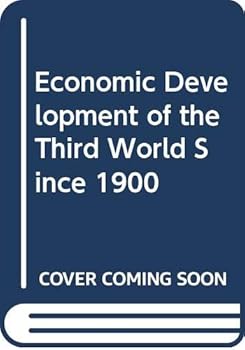The Economic Development of the Third World Since 1900
Select Format
Select Condition 
Book Overview
First published in 1967, Professor Bairoch's Diagnostic de L'Evolution Economique du Tiers-Monde has gone into four editions, and has brought the author an international reputation. This English translation is, in effect, another edition based on the latest French text but incorporating much which is not to be found there. The statistical tables have been revised and expanded wherever possible to include figures up to the end of 1972; the bibliography has been specially adapted to include the literature on the subject in the English language; and two new chapters have been written: Chapter 8 on 'Urbanization' and Chapter 9 on 'The labour force and employment'. It has been Professor Bairoch's aim in this book to examine the development of under-developed countries (including China) during the present century and through the use of comparative statistics to formulate a diagnosis of their growth. His analysis includes, whenever relevant, a comparison between the present economic progress of Third World countries and that of the developed countries at the time of their 'take off'. Special attention has also been given to China's unique path of development.In the course of his research the author has elaborated several new series. The production of these new series and their integration with existing data make this book a valuable quantitative economic history of the Third World.
Format:Paperback
Language:English
ISBN:0520035542
ISBN13:9780520035546
Release Date:April 1978
Publisher:University of California Press
Length:272 Pages
Weight:0.90 lbs.
Customer Reviews
1 rating
Classic study of development
Published by Thriftbooks.com User , 16 years ago
This is a classic study of development. He argues that sustained development needs to be socialist. As he writes, "It does not seem possible that a liberal regime, such as the free market economy which was the setting for the western industrial revolution, could nowadays be capable of giving less-developed countries similar opportunities for advance." He notes, "China's success and the, at least partial, failure of the non-communist Third World." For national development, land reform, i.e. expropriation of the landlord class, is essential. As he points out, "without agrarian reform a rise in productivity could have but a minor influence on development because the mass of the agricultural population would not be in a position to share in any of the benefits." To develop, nations need industry, and, as he observes, "it seems essential for the state to play a leading role in industrial investment." Governments need to defend their infant industries against destruction by foreign competitors, so "Policy makers should not be afraid to set up tariff barriers to protect local industries." He points out, "the success of industrialisation in the Third World is primarily dependent on domestic demand", not on exports. This is true not just in the Third World. He sums up, "the fundamental choices should be subject to a national plan and the state should, in addition to the traditional fields of centralized powers, intervene extensively in the following ways: 1. by stimulating agricultural development on a vast scale: where this stimulation requires an agrarian reform this reform should be a priority; 2. by creating industrial enterprises which favour general economic development and by devising a tariff policy which encourages industry; 3. by instituting a policy of birth control."





